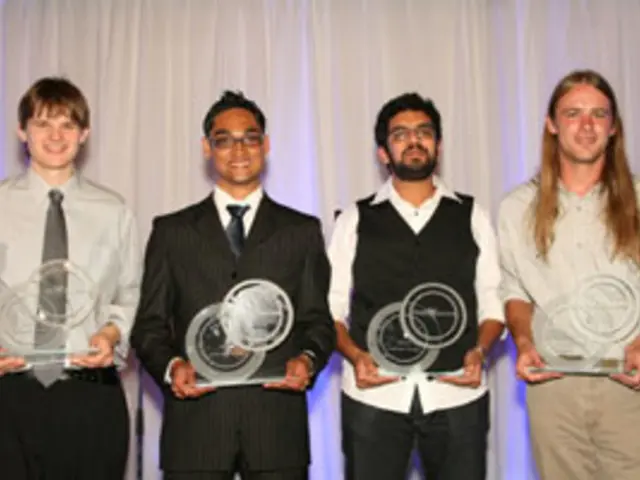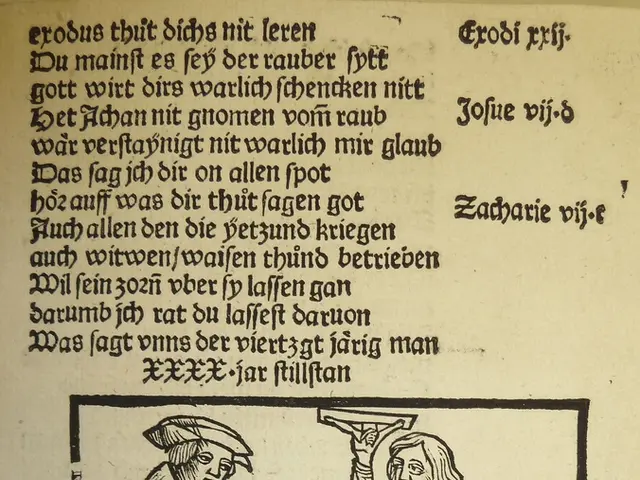Emphasizes the significant value of academic autonomy
In the heart of Berlin, Germany, the German Academic Exchange Service (DAAD) celebrated its 100th anniversary with a grand event at Freie Universität Berlin. The occasion marked a significant milestone in the history of DAAD, an organisation that has been fostering international academic exchange for a century[1].
The highlight of the celebrations was the announcement of the "1,000 Heads Programme," a new initiative aimed at attracting international talent, specifically highly skilled researchers and academics, to Germany[2]. This programme, part of the new German Federal Government's coalition agreement, seeks to bring in 1,000 talented individuals from abroad each year, thereby enhancing Germany's research and innovation landscape[1][2].
The "1,000 Heads Programme" is designed to support and expand research stays in Germany by providing fellowships and facilitating the establishment of research groups across various career stages[5]. This initiative is part of a broader push to strengthen Germany's appeal as a destination for global scientific talent and to reinforce academic freedom and international cooperation in research[5].
Germany's Basic Law guarantees the freedom of art, science, academia, research, and teaching, ensuring a democratic and open research environment[6]. The country is positioning itself as an outstanding location for study and research, with the "1,000 Heads Programme" being a testament to this commitment.
The event was attended by around 500 funding recipients, including scholarship holders from 94 countries, who were warmly welcomed by Germany's Foreign Minister, Johann Wadephul. In his address, Wadephul emphasised the importance of academic freedom in Germany and expressed concern about the decreasing academic freedom in some European neighbours and allies[4].
Wadephul's speech underscored the diversity of the attendees, highlighting the international nature of the event and the programme itself. The "1,000 Heads Programme" aims not only to attract talent but also to foster international collaboration, thereby reinforcing Germany's position as a hub for global academic and scientific excellence[1][2][5].
The centennial celebrations served as a reminder of DAAD's enduring commitment to fostering international academic exchange and its role in shaping Germany's academic landscape. As the "1,000 Heads Programme" takes shape, it is expected to significantly contribute to this legacy, making Germany an even more attractive destination for global talent.
[1] https://www.daad.de/de/presse/pressemitteilungen/2021/07/2021-07-01-neue-initiative-zur-anziehung-von-internationalem-wissenschaftspersonal/ [2] https://www.bundesregierung.de/breg-de/themen/bildung-wissenschaft-forschung/1000-heads-programme-1441960 [3] https://www.bundesregierung.de/breg-de/themen/bildung-wissenschaft-forschung/1000-heads-programme-1441960 [4] https://www.daad.de/de/presse/pressemitteilungen/2021/07/2021-07-01-neue-initiative-zur-anziehung-von-internationalem-wissenschaftspersonal/ [5] https://www.bundesregierung.de/breg-de/themen/bildung-wissenschaft-forschung/1000-heads-programme-1441960 [6] https://www.gesetze-im-internet.de/englisch_gg/englisch_gg.html#p0013
- The "1,000 Heads Programme," a new initiative unveiled during the DAAD's centennial celebration, can be found on the official websites of both the German Academic Exchange Service (DAAD) and the German Federal Government (Bundesregierung) for education-and-self-development, politics, and general-news [1, 2, 3].
- German Foreign Minister, Johann Wadephul, during his address at the DAAD centennial event, discussed the importance of academic freedom and the international nature of the "1,000 Heads Programme" on deutschland.de, providing insights on politics, education-and-self-development, and general-news. [4]




